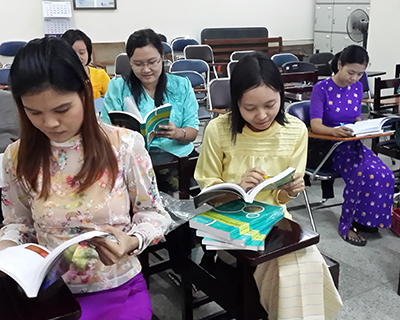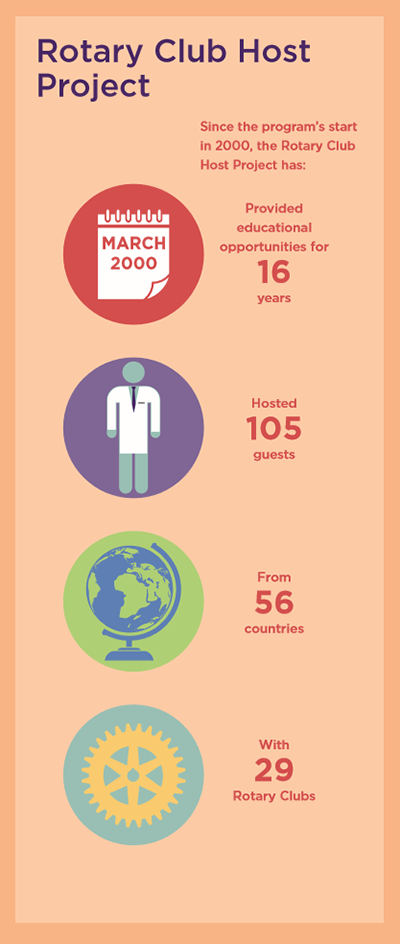Reaching Beyond Borders to Inspire Leadership

Residents and trainees at the Yangon Eye Hospital, Myanmar, study their new copies of Basic Ophthalmology and the Basic and Clinical Science Course. Learning from current, preeminent resources like the BCSC will help these ophthalmologists raise the standard of care in their country.
BY SUPPORTING EDUCATIONAL INITIATIVES beyond our borders, the Academy helps prevent blindness alongside the greater global ophthalmology community. Through its Foundation-funded global outreach programs, the Academy equips our colleagues in developing nations who have limited educational resources. This collaboration ensures that patients throughout the world have access to quality eye care.
ROTARY CLUB HOST PROJECT
High-quality ophthalmic education is critical in providing timely and skillful care, especially in impoverished areas with scarce training programs and resources. Through the Host an Ophthalmologist Program and the Rotary Club Host Project, the Academy helps ophthalmologists from developing nations visit the United States and participate in the Academy’s annual meeting. These opportunities provide invaluable educational, professional and cultural experiences.
Last year, the programs brought 31 ophthalmologists to AAO 2015, the Academy’s annual meeting in Las Vegas. During the meeting, they learned new treatment methods and surgical procedures. In turn, these participants could later share what they learned with colleagues at home, who were then able to use that knowledge when treating their own patients.
Some participants are inspired to become leaders for change in their home countries. “Participating in the Rotary Club Host Project was extremely beneficial for me,” said Olena Hurzhii, MD, a young ophthalmologist from Ukraine. “It was a big pleasure for me to meet ophthalmologists from all over the world and discuss issues which everyone is faced with in my homeland. Their decisions and actions helped me to look at ophthalmology in my country from another perspective. I feel very motivated and inspired to do what I can to improve educational activities, treatment guidelines and protocols to world-best practices.”
As a result of her experience, Nigerian participant Ngozi C. Oguego, MD, intends to set up a new blindness-prevention strategy that will reach children with vision problems. “I have been stimulated to further improve my skills through training so I can offer more,” she said. “I will embark on more training next year and I will be able to offer better care to my patients.”

To date, the Rotary Club Host Project has partnered with 29 Rotary Clubs to host 105 ophthalmologists from 56 countries.
EDUCATION DISTRIBUTION PROJECT
In many developing nations, educational resources are a luxury. In some cases, all of the ophthalmology residents in one program share a single set of books. The Academy’s Education Distribution Project helps close the educational gap by providing materials to training programs in developing countries. In 2015, the program:
• Donated 155 full sets of the Academy’s flagship 13-volume Basic and Clinical Science Course to training programs, 125 of which were sent in partnership with the International Council of Ophthalmology;
• Distributed 312 bags of assorted books and surgical DVDs to AAO 2015 attendees from developing countries; and
• Provided ONE Network access to 35,427 ophthalmologists in 51 developing countries. The ONE Network is available globally through partnerships with ophthalmic societies and to all ophthalmologists in developing nations. Access to this vast resource helps them keep up with the most current news and cutting-edge techniques. To better serve this global audience, the ONE Network now offers Summary Benchmarks in 15 languages.